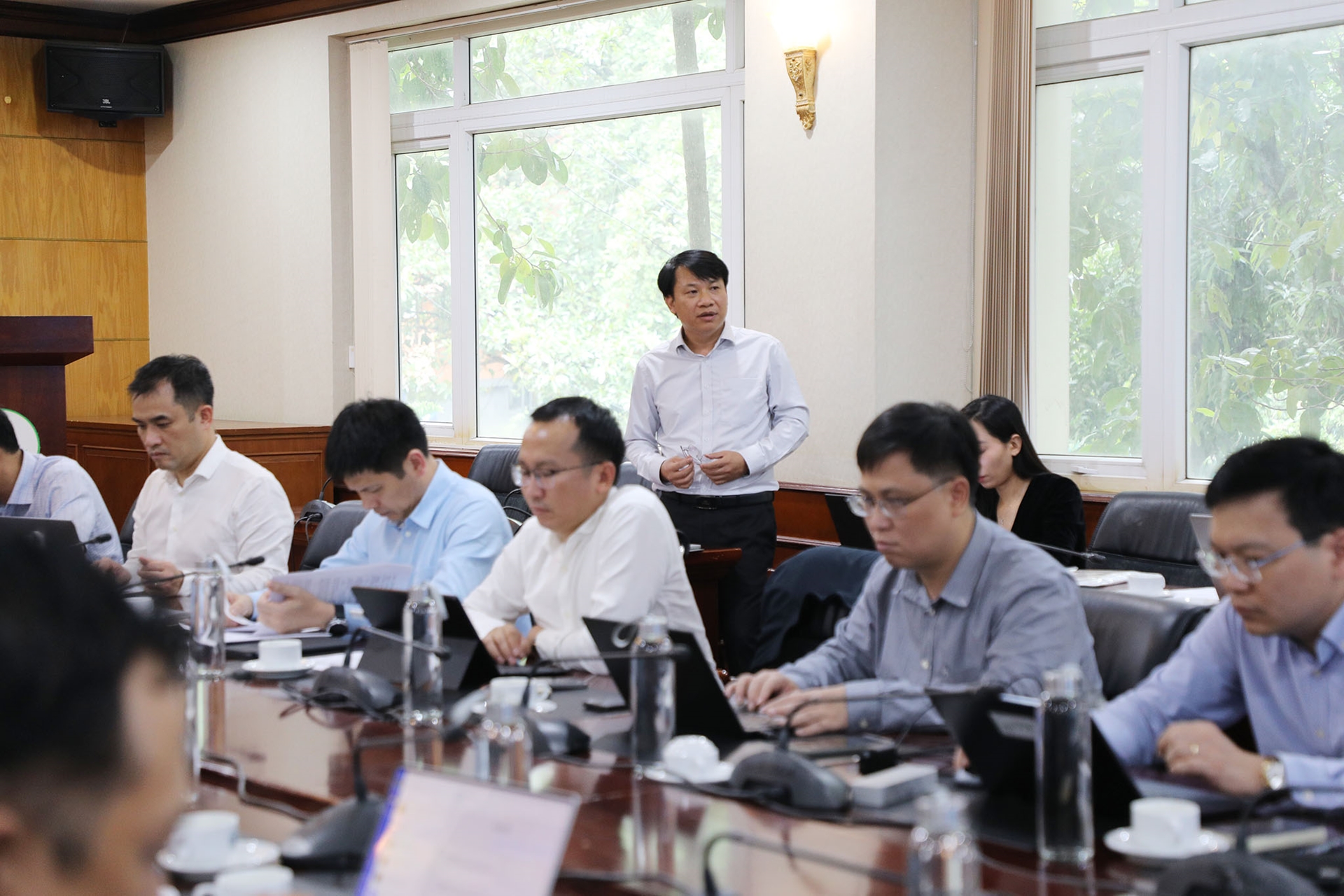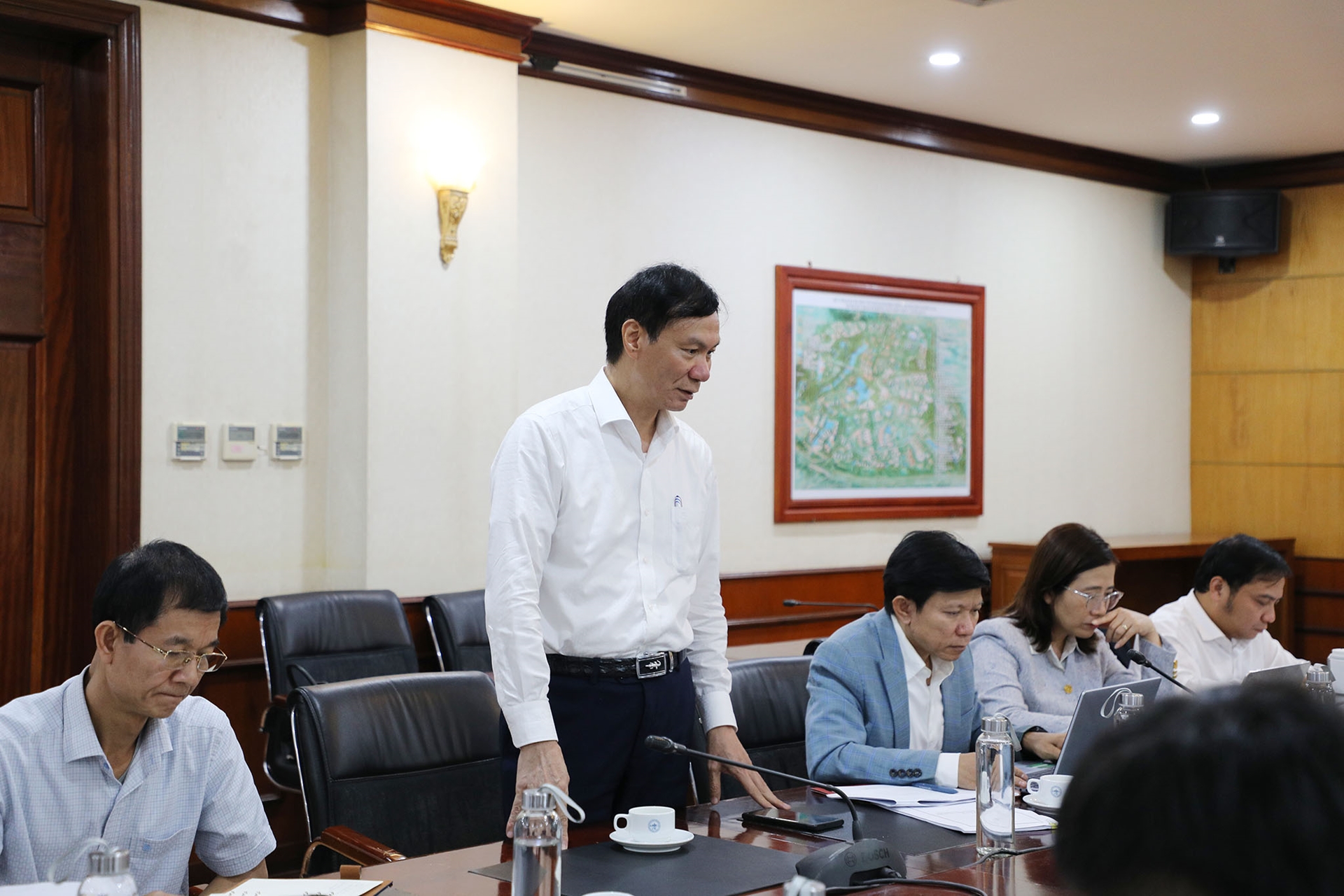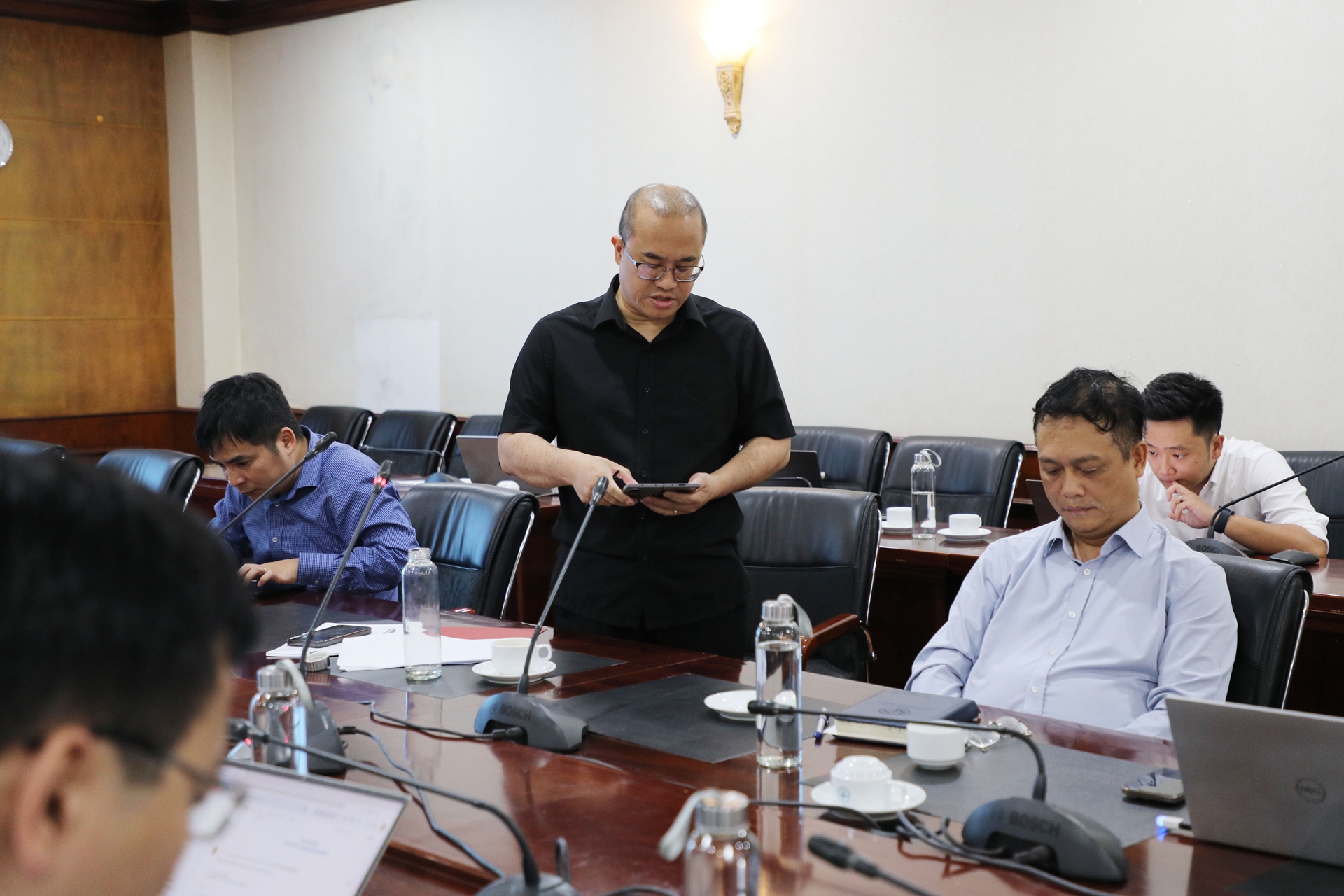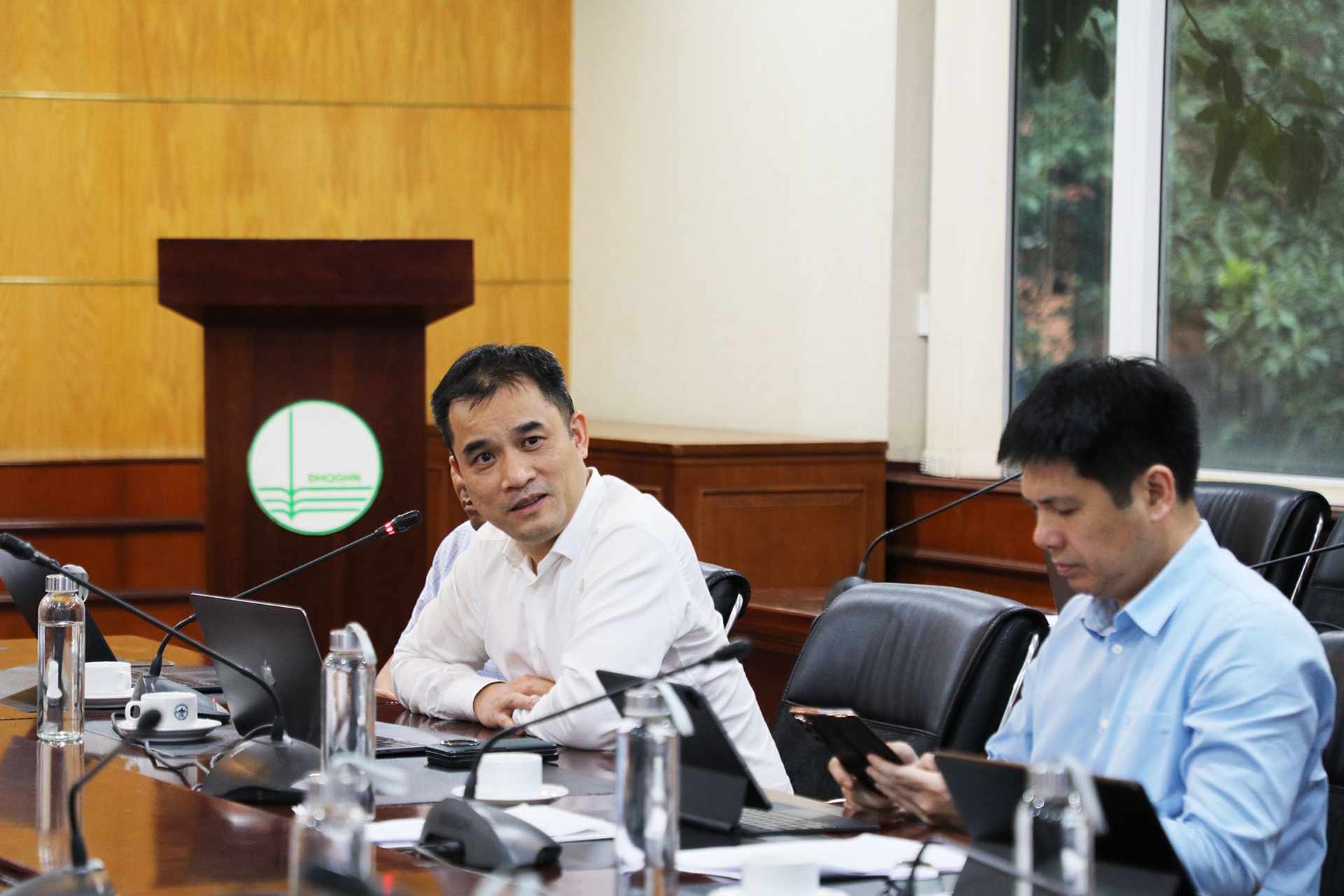Also attending were Deputy Directors Nguyen Hieu, Nguyen Hoang Hai, Pham Bao Son, Dao Thanh Truong, members of the Project Steering Committee, and heads of several member and affiliated training units.
On October 17, 2025, the Director of Vietnam National University, Hanoi (VNU) issued Decision No. 5419/QD-VNU on the establishment of the Steering Committee for the development and implementation of the VNU development plan to become an elite university, belonging to the group of leading higher education institutions in the world by 2030. The Steering Committee consists of 12 members, chaired by VNU Director Hoang Minh Son. The Steering Committee is tasked with directing and supervising units, organizations, and individuals within VNU, and coordinating with relevant parties to develop, finalize, and implement the VNU development plan until 2030.
The Director of Vietnam National University, Hanoi, Hoang Minh Son, emphasized the need to review and rebuild the development strategy of Vietnam National University, Hanoi in the new context, ensuring close alignment with major resolutions of the Party and Government, especially Resolution No. 57-NQ/TW on the development of science, technology, innovation and digital transformation; Resolution No. 71-NQ/TW on breakthroughs in education and training; and Announcement No. 45-TB/TGV assigning Vietnam National University, Hanoi national strategic targets.
The Vietnam National University, Hanoi (VNU) is tasked by the Party and State with developing into an elite university, ranking among the Top 100 in Asia by 2030, with some fields reaching the Top 100 globally by 2035. Along with its Development Strategy for the period 2025–2035, with a vision to 2045, VNU will also develop a proposal to submit to the Government to suggest specific policies and key resources for implementation.
According to Nghiêm Xuân Huy, Director of the Institute for Digital Training and Testing and representing the drafting committee, the draft Development Strategy for the period 2025–2035, with a vision to 2045, is built on three major directions.
Reporting at the working session, Director of the Institute of Digital Training and Testing Nghiem Xuan Huy, representing the Drafting Team, said that the draft Development Strategy for the period 2025–2035, vision 2045 is built on three major orientations: (1) Leveraging the combined strength from the traditions and interdisciplinary strengths and specific characteristics of the units throughout VNU; (2) Linking the development of VNU with the development of the nation and Hanoi Capital; (3) Taking innovation - development of excellence - comprehensive autonomy as the three core driving forces, and taking global connectivity as the development space.
Vietnam National University, Hanoi (VNU) has set several targets: total revenue reaching VND 6,000 billion per year by 2030, the proportion of revenue from science, technology and innovation reaching at least 35%, and the formation of 50 startup businesses each year with a total research investment of over USD 50 million.
With a vision to 2045, VNU positions itself as "a world-leading, elite research and innovation university, creating and leading knowledge to serve national development". The strategy establishes 6 pillars of development including: (1) Optimal governance and creative space; (2) Talent convergence and development; (3) High-level research linked to elite training; (4) Sustainable financial foundation; (5) Modern and synchronized technology; (6) Integrated, green and smart university urban area in Hoa Lac.
During the meeting, leaders of member and affiliated universities exchanged ideas and provided feedback focusing on improving the draft strategy.
According to Nguyen Quy Thanh, Rector of the University of Education, the Vietnam National University, Hanoi's development strategy needs to clearly identify key sectors for breakthrough investment, with a specific phased roadmap for each stage.
According to Nguyen Quy Thanh, Rector of the University of Education, the Vietnam National University, Hanoi (VNU) development strategy needs to clearly identify key sectors for breakthrough investment, with a specific phased roadmap for each stage, avoiding the dispersion of resources. He suggested that VNU should leverage cooperation mechanisms with research institutes inside and outside the two academies, forming a team of professional researchers instead of part-time lecturers. At the same time, it is necessary to clearly define the image of an elite university in the next 5-10 years in terms of organizational structure, training programs, and entrance standards, aiming for a tiered training model between elite and mass programs.
Rector of the University of Social Sciences and Humanities, Hoang Anh Tuan, requested a clearer explanation of the cultural and creative identity of Vietnam National University, Hanoi.
Rector of the University of Social Sciences and Humanities, Hoang Anh Tuan, suggested clarifying the cultural and creative identity of Vietnam National University, Hanoi. He emphasized three breakthrough elements that need to be focused on: awareness, institutions, and resources, and proposed adjusting the vision towards a "Smart Research University".
Nguyen Van Hieu, Rector of the School of Interdisciplinary Sciences and Arts, suggested that the draft strategy should highlight the multidisciplinary and multi-field identity of Vietnam National University, Hanoi.
Nguyen Van Hieu, Rector of the School of Interdisciplinary Sciences and Arts, suggested that the draft strategy should highlight the multidisciplinary and multi-field identity of Vietnam National University, Hanoi (VNU) and clearly identify the key areas for developing cultural and creative industries – a field with great potential and in line with national policy.
According to Trinh Tien Viet, Acting Rector of the University of Law, the strategy should reflect self-reliance and not be dependent on assigned targets.
According to Trinh Tien Viet, Acting Rector of the University of Law, the strategy should reflect self-reliance, not be dependent on assigned targets, and should incorporate the goal of serving the community into its development perspective.
Principal Hoang Dinh Phi of the School of Management and Business suggested that the draft strategy should adhere closely to strategic management theory.
The Rector of the School of Management and Business, Hoang Dinh Phi, suggested that the draft strategy should adhere closely to strategic management theory, include measurable indicators, and be linked to Resolution 57-NQ/TW and Resolution 71-NQ/TW. He proposed the goal of 100% of programs achieving international accreditation within the next 10 years to enhance academic prestige and attract international students.
Chairman of the University Council of the University of Economics, Nguyen Truc Le, proposed that the Vietnam National University, Hanoi (VNU) be considered the nation's intellectual and innovative hub, directly contributing to solving major national problems.
Chairman of the University Council of the University of Economics, Nguyen Truc Le, proposed that the Vietnam National University, Hanoi (VNU) be considered the nation's knowledge and innovation hub, directly contributing to solving major problems such as semiconductors, AI, biotechnology, and the digital economy; implementing a postgraduate training model linked to businesses; and establishing Centers of Excellence (COE) and VNU Dashboard for data-driven governance.
The Vice-Rectors of VNU Hanoi all highly agreed with the strategic direction, while also offering suggestions to ensure feasibility and consistency in the implementation process.
According to Nguyen Hieu, the Standing Vice Director of Vietnam National University, Hanoi (VNU), the draft Strategy fully reflects the major orientations of VNU in the new phase, but it is necessary to clearly identify internal weaknesses.
According to the Vice Rector of Vietnam National University, Hanoi (VNU), Nguyen Hieu, the draft Strategy fully reflects the major orientations of VNU in the new phase, but it is necessary to clearly identify internal weaknesses in terms of elite human resources, research infrastructure, and financial resources. He proposed adding the value phrase "developing elites" to the core values system, and clarifying the target milestones for 2030-2035-2045 to ensure measurability and feasibility. Vice Rector Nguyen Hieu also emphasized that VNU needs to more clearly demonstrate its leading role in the national higher education and science and technology system, linked to contributing to the socio-economic development of Hanoi and the whole country.

Deputy Director Dao Thanh Truong assessed that the development strategy of Vietnam National University, Hanoi in the coming period must go hand in hand with a vision of excellence and organizational culture, creating a distinct academic identity for the national university.
Deputy Director Dao Thanh Truong assessed that the development strategy of Vietnam National University, Hanoi (VNU) in the coming period must go hand in hand with a vision of excellence and organizational culture, creating a distinct academic identity for the national university. He proposed building a focused and targeted policy to attract and retain talent, coupled with specific indicators for evaluating research capacity and social contribution. In addition, Deputy Director Dao Thanh Truong emphasized the need to promote postgraduate training and internationalize training programs, considering this a key driving force in forming a community of elite scholars capable of integration and leading the field of knowledge.
Vice Director Pham Bao Son emphasized the role of the social sciences and humanities sector in the overall development structure of Vietnam National University, Hanoi.
Vice Rector Pham Bao Son emphasized the role of the social sciences and humanities sector in the overall development structure of Vietnam National University, Hanoi (VNU), considering it the foundation for strategic technology fields such as artificial intelligence and data science. He also pointed out the challenge of limited interdisciplinary coordination mechanisms, which prevents interdisciplinary research groups from fully realizing their potential. He proposed that VNU must simultaneously build core conditions for interdisciplinary development: working in the same space (Hoa Lac), having common projects and tasks, having interdisciplinary organizations, and having mechanisms for resource sharing and appropriate incentive policies.

Deputy Director Nguyen Hoang Hai affirmed that the goal of being in the Top 100 in Asia and Top 200 in the world requires Vietnam National University, Hanoi to clearly define the fundamental conditions regarding infrastructure, human resources, and timeline.
Vice Rector Nguyen Hoang Hai affirmed that the goal of ranking in the Top 100 in Asia and Top 200 in the world requires Vietnam National University, Hanoi (VNU) to clearly define the fundamental conditions regarding infrastructure, human resources, and timelines, ensuring feasibility in implementation. He proposed establishing a flexible mechanism for students to switch majors, while expanding full scholarships for doctoral students, especially in basic science, to encourage in-depth research. Vice Rector Nguyen Hoang Hai also emphasized the need to build an open, creative, and humane academic environment where knowledge is respected, freely exchanged, and science becomes the core value of an elite university.

Concluding the meeting, the Director of Vietnam National University, Hanoi, Hoang Minh Son, emphasized that the Strategy and Development Plan of Vietnam National University, Hanoi until 2030, with a vision to 2045, must clearly demonstrate the role, responsibility, and national mission of Vietnam National University, Hanoi – a leading university center in the country tasked with leading knowledge, science, and innovation to serve national development.
He affirmed that all development activities must aim for tangible results, with budget investment linked to the mission, quality, and output efficiency. The Director of VNU further noted the spatial orientation, emphasizing that the VNU Urban Area needs to be systematically planned and invested in to become a national-scale center for knowledge, research, and innovation, a place for the formation of R&D centers for large corporations, and a source of sustainable revenue for VNU.
Director Hoang Minh Son also emphasized the need to make the right choices and focus investment on strategic areas, including semiconductors, artificial intelligence, biotechnology and biomedical technology, cybersecurity, along with social science fields related to management and development governance. He requested that units propose specific industries and industry groups with the potential to enter the Top 100 or Top 200 in the world.
Regarding strategic targets, Director Hoang Minh Son requested a focus on core indicators that demonstrate substantial contributions to the capital and the country, such as attracting talent, training talent, developing science and technology, innovation, and serving the community, avoiding setting vague goals lacking a solid foundation and implementation roadmap.
The Director of VNU, Hoang Minh Son, instructed the Standing Committee of the Steering Committee and the Drafting Team to urgently finalize the draft Strategy/Project, fully incorporate all feedback, and submit it to the Board of Directors for approval so that the next steps can be implemented as soon as possible.












